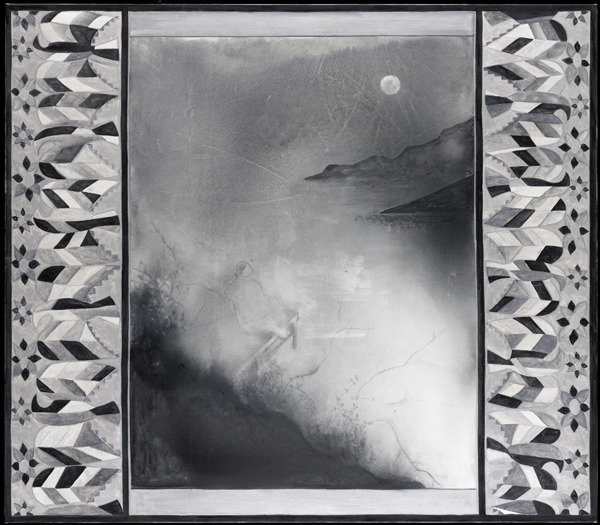Silke Otto-Knapp / Carl Fredrik Hill
dal 10/3/2014 al 24/5/2014
Segnalato da
10/3/2014
Silke Otto-Knapp / Carl Fredrik Hill
Kunsthalle Wien, Wien
Questions of travel (Wien). Selected works by two artists who, each within their own genre and time, have focused intensively on the representation of landscapes, stages and theatrical spaces. The interweaving of body and space in the works of Knapp, are aspects equally to be found in the selection of drawings by Hill.

Curator Martin Walkner
Kunsthalle Wien opens its Karlsplatz program for this year with the exhibition
Silke Otto-Knapp / Carl Fredrik Hill. Questions of Travel (Wien). The exhibition brings
together selected works by two artists who, each within their own genre and time, have
focused intensively on the artistic representation of landscapes, stages and theatrical
spaces.
Taking a poem by the well-known American author Elizabeth Bishop as its point of
departure, the exhibition Silke Otto-Knapp / Carl Fredrik Hill. Questions of Travel
(Wien) examines questions of spatial perception and the interweaving of body and
space. For Silke Otto-Knapp, who regularly draws her inspiration from literature, it is
verses such as these that mark the poetic relationship between painterly art and the
written word: “Is it lack of imagination that makes us come to imagined places, not just
stay at home?” – asks Elizabeth Bishop in her poem Questions of Travel (1965) and
in doing so anticipates questions that are also valid for the paintings of Otto-Knapp
with their interest in the mechanisms of scenography, representation and visual
imagination.
In an interplay with the codes of modern dance and the stage-like character of the
glass exhibition space, the artist’s works and the urban outdoor space together create
a frame of reference that quotes and reflects the architecture of the site in a multi-
levelled manner. In this sense Otto-Knapp’s landscape images, reminiscent of stage
scenery, are concentrated zones of both nature and culture in which gardens expand
to fill the picture and clusters of buildings form atmospheric scenes.
In line with her discursive approach to the medium of painting, in her multi-layered,
almost monochrome-seeming works the artist examines the aspects of surface and
depth, contours and physicality, visual space and stage design. The countless layers
of black or grey watercolour paint that Otto-Knapp applies to the canvas, repeatedly
washes out and then reapplies ultimately create negative spaces and contours that
resemble photographic negatives.
The interweaving of body and space, together with the stage-like elements in the
works of Silke Otto-Knapp, are aspects equally to be found in the selection of
drawings by the Swedish artist Carl Fredrik Hill and which complement the exhibition
Questions of Travel (Wien). Seven small-format chalk drawings by Hill are presented,
or indeed staged, within the protective space of a cabinet, simultaneously in the heart
of the large transparent exhibition space.
Hill lived in France for several years during the last third of the 19th century and there,
inspired by Corot and the Barbizon School, he devoted himself chiefly to landscape
painting. He too, like Otto-Knapp, worked intensively with the stage space and used
this to create a scenography of expressive self-inquiry. In his own lifetime his works
met with incomprehension from culture critics, the public and artist colleagues.
Resigned and in a mentally instable state, Hill withdrew from society and, isolated in
his own world, created a fascinating work that draws from memory and conducts an
intensive examination of stages, ephemeral ballet scenes and landscapes.
Parallel to the Vienna exhibition, a further exhibition by the artist Silke Otto-Knapp
entitled Questions of Travel (Fogo) is being presented at Fogo Island Gallery in
Newfoundland, Canada. The two exhibitions in Vienna and Fogo Island are linked by
an exhibition catalogue published by Sternberg Press, examining the works of
Silke Otto-Knapp and containing texts by Vanessa Joan Müller, Susan Morgan and an
interview with the artist by Nicolaus Schafhausen.
Silke Otto-Knapp (*1970) studied Cultural Studies at the University of Hildesheim
and graduated from Chelsea College of Art and Design, London. She teaches at the
Academy of Fine Arts Vienna and since the start of 2014 has lived and worked in
Los Angeles, where she teaches at UCLA. Her solo exhibitions include: UC Berkeley
Art Museum and Pacific Film Archive (2011); Kunstverein München, Munich (2010) and
Tate Britain, London (2005).
Carl Fredrik Hill (1849–1911) studied painting at the Stockholm Academy of Arts and
continued his studies in France, where he lived and worked for several years. A large
part of his legacy is contained in the archive of Malmö Art Museum, Sweden.
Solo exhibitions include: 777, Bawag Contemporary, Vienna (2003), Carl Fredrik Hill.
Hill Hill Hill Hill Hill, Kunsthal Charlottenborg, Copenhagen (2013).
Image: Silke Otto-Knapp
Press contacts:
Katharina Murschetz T + 43 (0)1 521891221 / katharina.murschetz@kunsthallewien.at
Stefanie Obermeir +43 (0)1 521891224 presse@kunsthallewien.at
Press conference: Tuesday, March 11, 2014, 10 am
Opening: Tuesday, March 11, 2014, 7 pm
Kunsthalle Wien GmbH
Museumsplatz 1 1070 Wien, Austria
Visitor Information
Opening Hours:
Daily 10 am – 7 pm
Thursday 10 am – 9 pm
Admission:
General EUR 8
Reduced* EUR 6
Students/apprentices EUR 2
Children (under 10) free
Groups (min. 10 persons) EUR 6
Family ticket EUR 12



